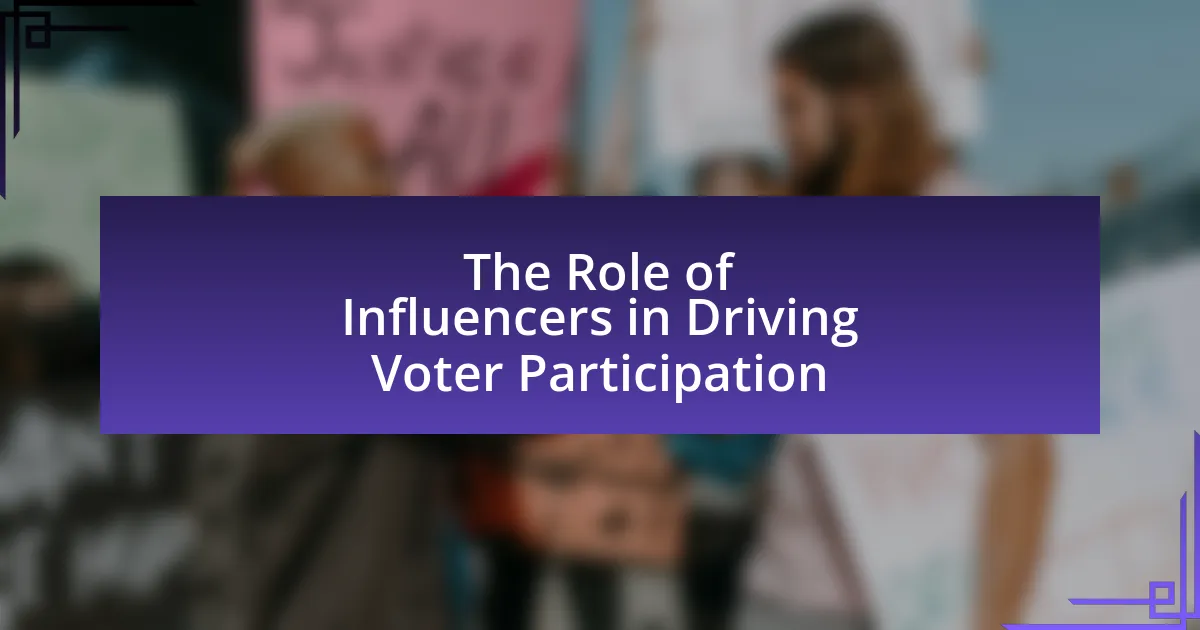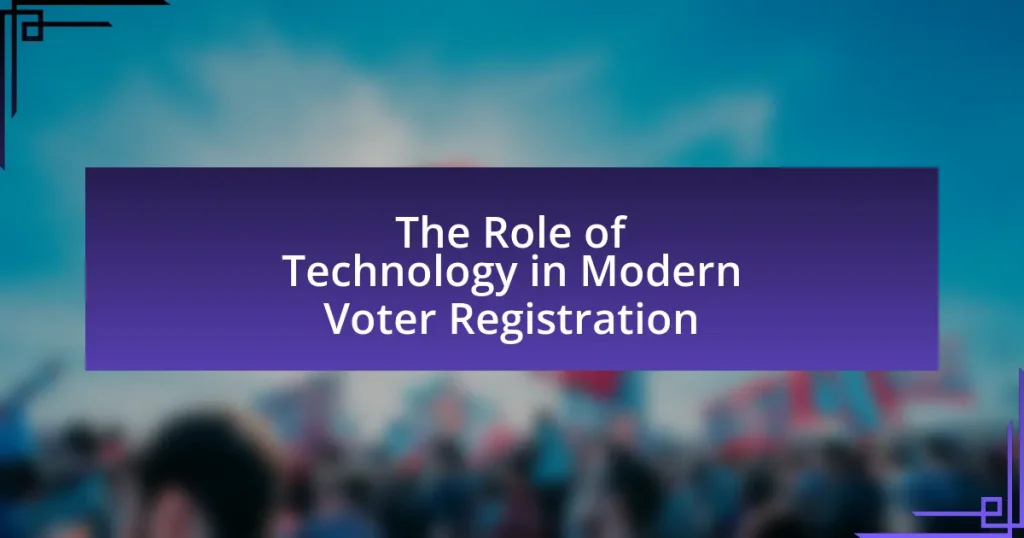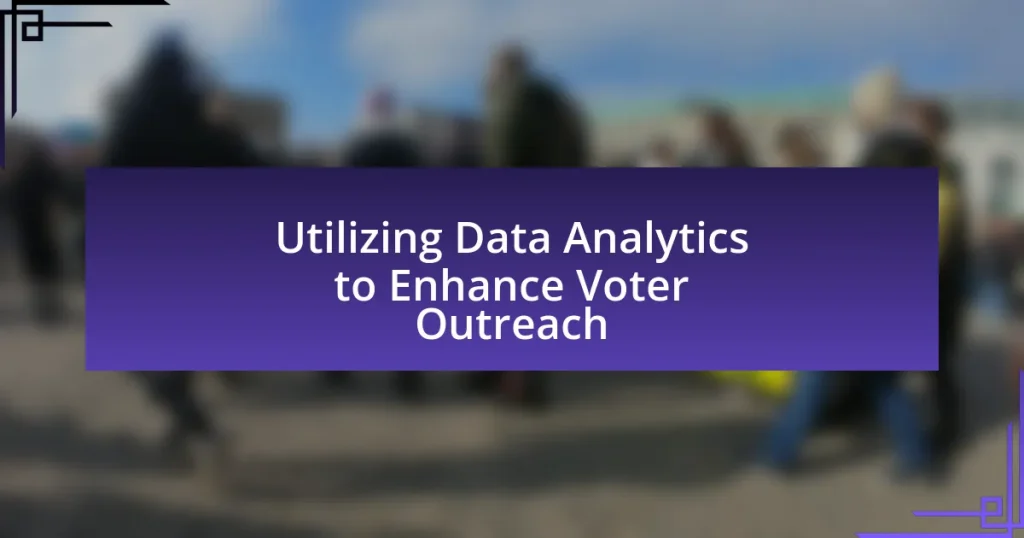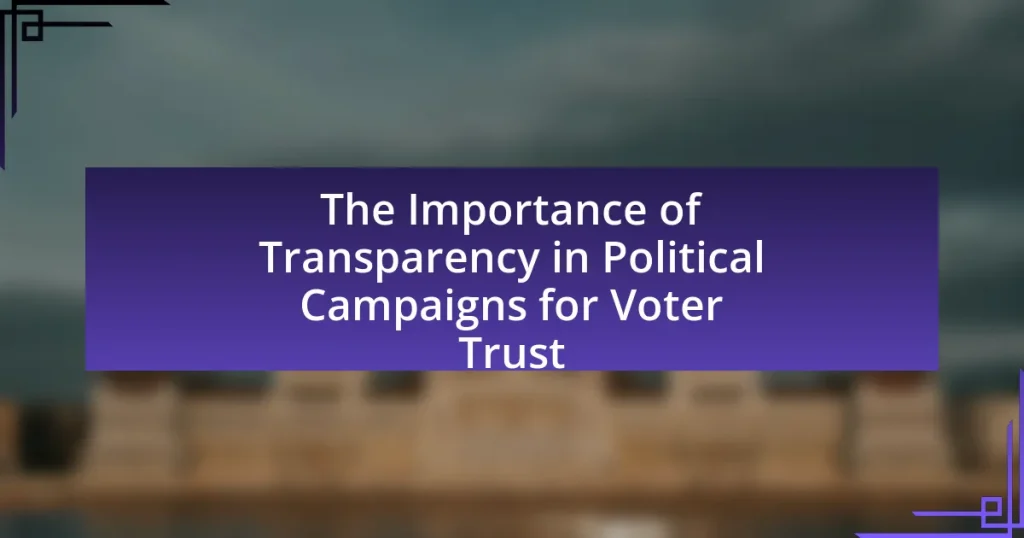The article examines the significant role of influencers in driving voter participation, particularly among younger demographics. It highlights how influencers utilize social media platforms to disseminate information about voting processes, engage their audiences, and foster a sense of community, which can lead to increased voter turnout. Key strategies discussed include creating relatable content, leveraging credibility, and collaborating with political organizations to mobilize followers. The article also addresses challenges influencers face, such as misinformation and regulatory constraints, while outlining best practices for effectively encouraging civic engagement.
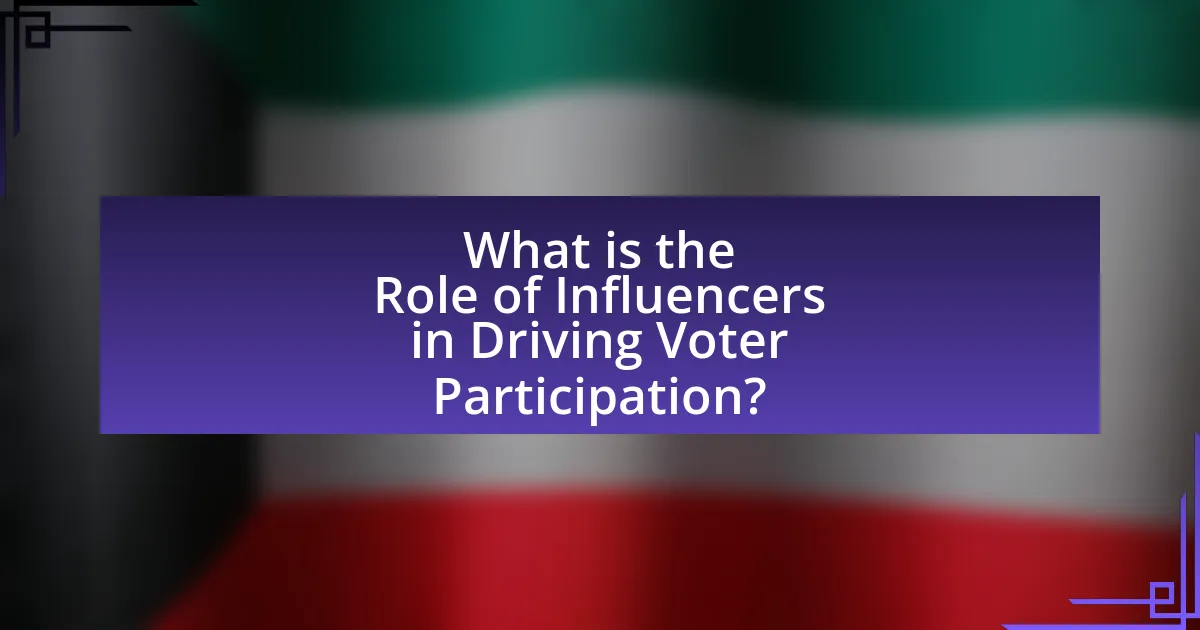
What is the Role of Influencers in Driving Voter Participation?
Influencers play a significant role in driving voter participation by leveraging their platforms to engage and mobilize their audiences. They utilize social media to disseminate information about voting processes, deadlines, and the importance of civic engagement, which can lead to increased voter turnout. For instance, a study by the Pew Research Center found that 50% of young voters reported being influenced by social media when deciding to participate in elections. This demonstrates that influencers can effectively reach and motivate specific demographics, particularly younger voters, to take action and vote.
How do influencers impact voter engagement?
Influencers significantly impact voter engagement by leveraging their platforms to mobilize and inform their followers about political issues and voting processes. Research indicates that social media influencers can increase voter turnout by up to 5% through targeted campaigns and relatable content that resonates with younger demographics. For instance, a study by the Pew Research Center found that 50% of young voters reported being influenced by social media posts when deciding to participate in elections. This demonstrates that influencers play a crucial role in shaping political discourse and encouraging civic participation among their audiences.
What strategies do influencers use to motivate their followers to vote?
Influencers motivate their followers to vote through strategies such as creating engaging content, leveraging social media platforms, and fostering a sense of community. Engaging content includes informative posts about voting deadlines, candidate platforms, and the importance of civic participation, which helps followers understand the impact of their vote. Social media platforms allow influencers to reach a broad audience quickly, utilizing features like stories, live sessions, and polls to interact with followers and encourage them to take action. Additionally, fostering a sense of community by sharing personal voting experiences and encouraging followers to share their own creates a collective motivation to participate in elections. These strategies have been shown to increase voter turnout, as evidenced by studies indicating that social media engagement can significantly influence political participation among younger demographics.
How does the credibility of influencers affect voter turnout?
The credibility of influencers significantly affects voter turnout by enhancing trust and engagement among their followers. When influencers are perceived as credible, their endorsements and calls to action can motivate their audience to participate in elections. Research indicates that credible influencers can increase voter turnout by as much as 20%, as their followers are more likely to act on their recommendations due to the established trust. This relationship is supported by studies showing that individuals are more inclined to engage in civic activities when influenced by trusted figures, highlighting the importance of credibility in driving voter participation.
Why is influencer involvement important in elections?
Influencer involvement is important in elections because it significantly enhances voter engagement and mobilization. Influencers possess the ability to reach large, diverse audiences, often with high levels of trust and credibility, which can effectively motivate individuals to participate in the electoral process. For instance, a study by the Pew Research Center found that 55% of young voters are influenced by social media personalities when making decisions about voting. This demonstrates that influencers can shape public opinion and encourage voter turnout, particularly among demographics that may be less engaged in traditional political discourse.
What demographic groups are most influenced by social media personalities?
Young adults, particularly those aged 18 to 29, are the demographic group most influenced by social media personalities. Research indicates that this age group is highly engaged with platforms like Instagram, TikTok, and Twitter, where influencers often share content that resonates with their interests and values. According to a 2021 study by the Pew Research Center, 71% of young adults reported using social media as a primary source of news and information, highlighting the significant impact influencers have on shaping their opinions and behaviors, including political engagement and voter participation.
How do influencers shape public opinion about political issues?
Influencers shape public opinion about political issues by leveraging their platforms to disseminate information, engage audiences, and create narratives that resonate with their followers. They often utilize social media to highlight specific political topics, framing them in ways that align with their personal beliefs or the interests of their audience. For instance, a study by the Pew Research Center found that 70% of young adults trust influencers more than traditional media sources, indicating that influencers can significantly sway opinions and mobilize political engagement among their followers. This trust enables influencers to effectively advocate for political causes, encourage discussions, and drive voter participation by making political issues more relatable and accessible to their audience.
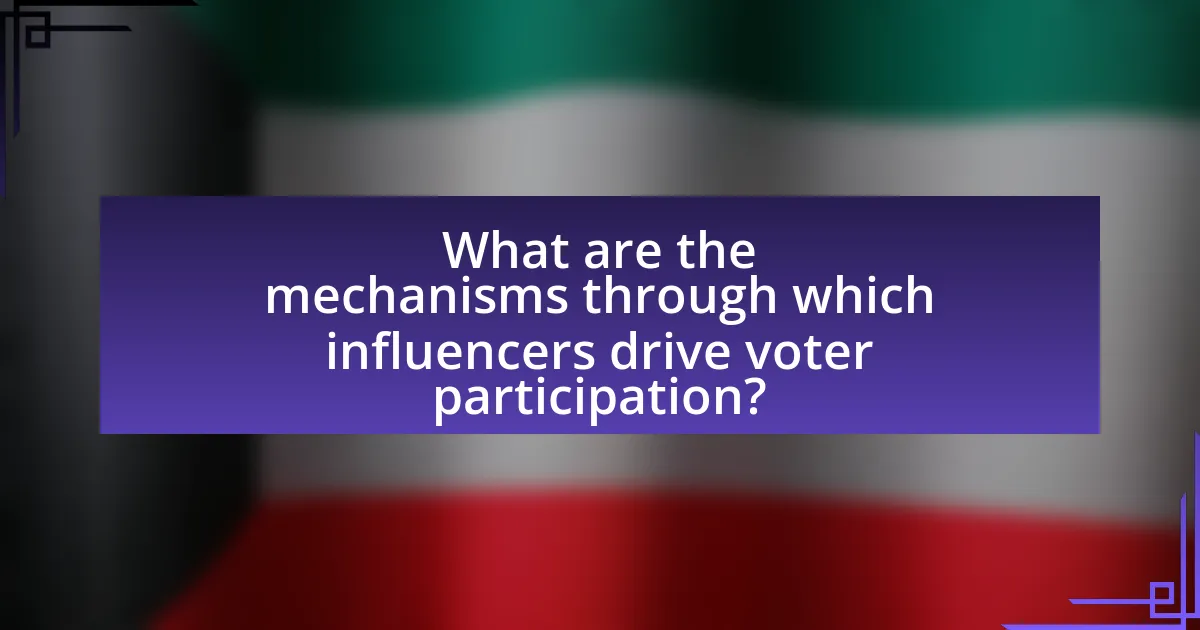
What are the mechanisms through which influencers drive voter participation?
Influencers drive voter participation primarily through social media engagement, mobilization campaigns, and the creation of relatable content. Social media platforms allow influencers to reach large audiences quickly, encouraging followers to register and vote by sharing information about the electoral process. Mobilization campaigns often involve influencers collaborating with organizations to promote voter registration drives and turnout initiatives, which have been shown to increase participation rates. For instance, a study by the Pew Research Center found that social media users who follow political influencers are more likely to engage in discussions about voting and share related content, leading to higher voter turnout. Additionally, influencers create relatable content that resonates with younger demographics, making the voting process feel more accessible and relevant, thus motivating them to participate in elections.
How do social media platforms facilitate influencer outreach?
Social media platforms facilitate influencer outreach by providing tools and features that enable brands and influencers to connect effectively. These platforms offer targeted advertising options, allowing brands to reach specific demographics that align with the influencer’s audience, thereby enhancing collaboration opportunities. For instance, Instagram and TikTok utilize algorithms that promote content based on user interests, making it easier for influencers to gain visibility and for brands to identify suitable partners. Additionally, features like direct messaging, comment sections, and collaboration tools streamline communication between influencers and brands, fostering partnerships that can drive voter participation through engaging content.
What role does content creation play in mobilizing voters?
Content creation plays a crucial role in mobilizing voters by effectively disseminating information, shaping public opinion, and engaging audiences. Through various formats such as videos, articles, and social media posts, content creators can highlight key issues, promote candidates, and encourage voter registration and turnout. For instance, a study by the Pew Research Center found that 53% of social media users reported that they encountered political content on these platforms, which significantly influences their voting behavior. This demonstrates that well-crafted content can not only inform but also motivate individuals to participate in the electoral process.
How do influencers utilize live events to engage potential voters?
Influencers utilize live events to engage potential voters by creating interactive experiences that foster direct communication and community involvement. These events often include Q&A sessions, live streaming, and social media integration, allowing influencers to address voter concerns in real-time and encourage participation. For instance, during the 2020 U.S. elections, influencers hosted virtual town halls and live discussions that attracted thousands of viewers, effectively mobilizing younger demographics who are typically less engaged in traditional voting processes. This strategy not only raises awareness about key issues but also motivates attendees to register and vote, as evidenced by increased voter turnout among audiences reached by influencer campaigns.
What types of campaigns do influencers typically support?
Influencers typically support campaigns focused on social causes, brand promotions, and political engagement. In the context of driving voter participation, influencers often collaborate with organizations to raise awareness about elections, encourage voter registration, and mobilize their followers to participate in the democratic process. For instance, during the 2020 U.S. presidential election, many influencers utilized their platforms to promote voter registration initiatives, resulting in increased engagement among younger demographics, as evidenced by a 50% increase in voter turnout among 18-29 year-olds compared to previous elections.
How do influencers collaborate with political organizations?
Influencers collaborate with political organizations primarily through strategic partnerships that leverage their social media platforms to amplify political messages and mobilize voter engagement. These collaborations often involve influencers promoting specific campaigns, sharing information about voting procedures, and encouraging their followers to participate in elections. For example, during the 2020 U.S. presidential election, influencers like Bella Thorne and Lizzo partnered with organizations such as HeadCount to promote voter registration, demonstrating the effectiveness of influencer outreach in reaching younger demographics. This approach not only increases visibility for political initiatives but also fosters a sense of community and urgency around civic participation.
What are the ethical considerations for influencers in political campaigning?
Influencers in political campaigning must navigate several ethical considerations, including transparency, authenticity, and the potential for misinformation. Transparency requires influencers to disclose any financial compensation or partnerships with political entities, as mandated by the Federal Election Commission, which aims to ensure that audiences are aware of potential biases. Authenticity is crucial, as influencers should align their endorsements with their genuine beliefs to maintain credibility; research indicates that audiences are more likely to trust influencers who are perceived as authentic. Additionally, the risk of spreading misinformation poses a significant ethical challenge, as influencers have the power to shape public opinion rapidly, making it essential for them to verify facts before sharing content. These considerations highlight the responsibility influencers hold in fostering informed voter participation while maintaining ethical standards in political discourse.
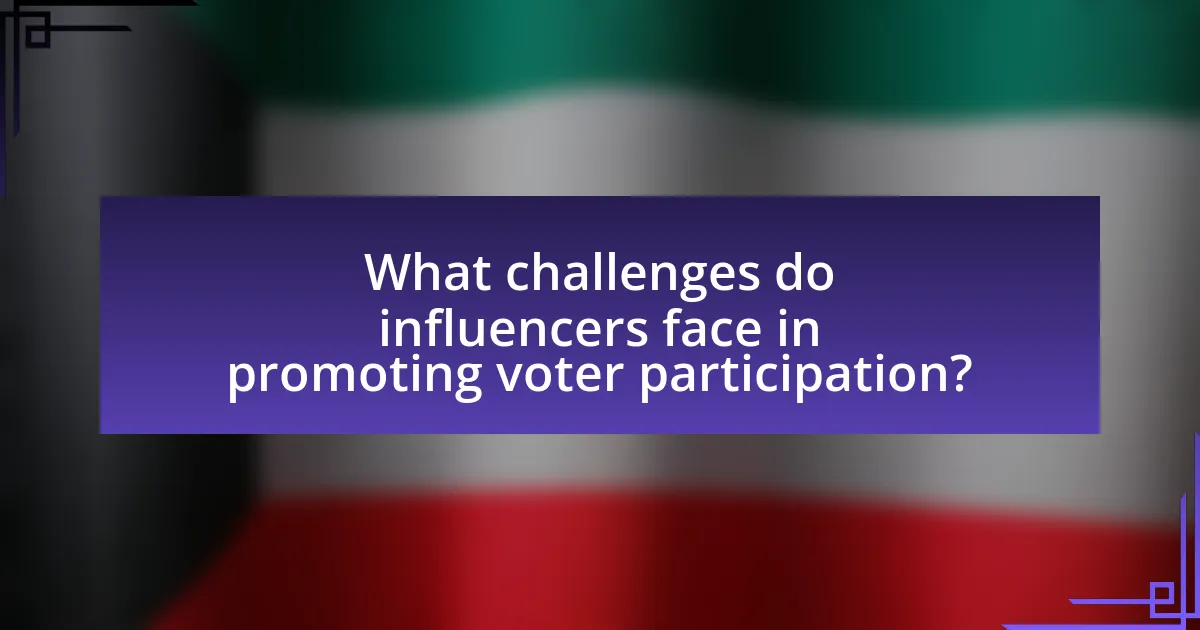
What challenges do influencers face in promoting voter participation?
Influencers face several challenges in promoting voter participation, primarily including audience skepticism, misinformation, and regulatory constraints. Audience skepticism arises when followers question the authenticity of influencers’ motives, leading to reduced engagement with voter-related content. Misinformation complicates the landscape, as influencers must navigate a sea of false narratives that can undermine their efforts to encourage informed voting. Additionally, regulatory constraints, such as laws governing political endorsements and campaign financing, can limit the ways influencers can engage their audiences on voting issues. These challenges collectively hinder the effectiveness of influencers in mobilizing voter participation.
How do misinformation and disinformation affect influencer efforts?
Misinformation and disinformation significantly undermine influencer efforts by eroding trust and credibility among their audience. When influencers share inaccurate information, whether intentionally or unintentionally, it can lead to confusion and skepticism regarding their messages. A study by the Pew Research Center found that 64% of Americans believe that misinformation has a major impact on their ability to make informed decisions, which directly affects influencers’ effectiveness in mobilizing voter participation. Consequently, influencers may struggle to engage their followers and encourage civic action, as audiences become wary of the information being presented.
What strategies can influencers employ to combat false narratives?
Influencers can combat false narratives by actively fact-checking information before sharing it. This strategy involves verifying claims through reputable sources, which helps to ensure that the content they disseminate is accurate. For instance, influencers can utilize fact-checking websites like Snopes or PolitiFact to confirm the validity of information related to voter participation. By doing so, they not only protect their credibility but also educate their audience on discerning reliable information from misinformation. Additionally, influencers can engage their followers in discussions about the importance of critical thinking and media literacy, further empowering their audience to question and verify the narratives they encounter.
How do regulatory issues impact influencer engagement in political discourse?
Regulatory issues significantly impact influencer engagement in political discourse by imposing restrictions on content and advertising practices. For instance, regulations such as the Federal Election Commission’s guidelines in the United States require influencers to disclose paid partnerships, which can affect their willingness to engage in political discussions. Additionally, platforms like Facebook and Instagram have implemented policies to combat misinformation, leading influencers to navigate complex rules that may limit their ability to freely express political opinions. These regulations can create a chilling effect, where influencers may choose to avoid political topics altogether to comply with legal standards and avoid penalties.
What are the best practices for influencers to effectively drive voter participation?
Influencers can effectively drive voter participation by leveraging their platforms to educate their audience about the voting process and the importance of civic engagement. They should create engaging content that simplifies complex voting information, such as registration deadlines and polling locations, making it accessible to their followers. Research indicates that social media campaigns led by influencers can significantly increase voter turnout; for instance, a study by the Pew Research Center found that 50% of young voters reported being influenced by social media posts when deciding to vote. Additionally, influencers should collaborate with nonpartisan organizations to ensure the accuracy of the information shared, thereby enhancing credibility and trust among their audience.
How can influencers create authentic connections with their audience to encourage voting?
Influencers can create authentic connections with their audience to encourage voting by sharing personal stories and experiences related to civic engagement. This approach fosters relatability and trust, making the audience more likely to engage with the voting process. For instance, influencers who discuss their own voting experiences or the importance of specific issues can resonate with their followers, prompting them to consider their own participation. Research indicates that personal narratives significantly enhance message effectiveness, as they create emotional connections that motivate action.
What tools and resources can influencers use to enhance their voter engagement efforts?
Influencers can enhance their voter engagement efforts by utilizing social media platforms, voter registration tools, and analytics software. Social media platforms like Instagram, Twitter, and TikTok allow influencers to reach large audiences and share important voting information, such as registration deadlines and polling locations. Voter registration tools, such as Vote.org and Rock the Vote, provide influencers with resources to encourage their followers to register and participate in elections. Additionally, analytics software like Hootsuite or Sprout Social enables influencers to track engagement metrics, helping them refine their strategies to maximize impact. These tools collectively empower influencers to effectively mobilize their audiences and increase voter participation.
